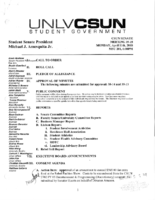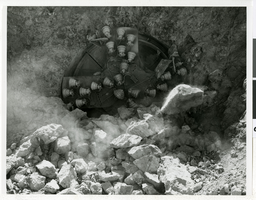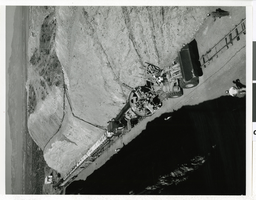Search the Special Collections and Archives Portal
Search Results
Carratelli Family Collection on Gay Rights in Nevada
Identifier
Abstract
The Carratelli Family Collection on Gay Rights in Nevada (1992-2002) consists of documents and ephemera from various gay rights organizations and events in Las Vegas, Nevada. In addition to documents, fliers, and meeting minutes, the collection houses a box of t-shirts from various gay events and campaigns. The collection is especially focused on issues of Gay Pride organizing.
Archival Collection
Benjamin F. Smith Papers
Identifier
Abstract
The Benjamin F. Smith Papers, dated from 1960 to 1969, contains a photocopy of a typed manuscript written by Benjamin F. Smith titled "Lady Luck and I." The manuscript details Smith's life, and focuses mainly on his time in Las Vegas, Nevada and his gambling strategies. The manuscript also contains gambling plays, figures, and charts. The collection also contains photocopied newspaper clippings and a brief biography of Smith written by Larry Evans.
Archival Collection
Vicki Cassman Faculty Papers and UNLV Memorabilia
Identifier
Abstract
The Vicki Cassman Faculty Papers and UNLV Memorabilia (approximately 1980-2004) are comprised of commemorative University of Nevada, Las Vegas (UNLV) memorabilia and papers pertaining to UNLV's 25th and 40th anniversaries as well as a 30th anniversary video tape for the Moyer Student Union. The collection also contains papers from the Department of Anthropology and Ethnic Studies history project (ANT 410/610) commemorating UNLV faculty member Claude Warren. The memorabilia in the collection includes a commemorative mug, golf ball, playing cards, and a media kit for the Sam Boyd Stadium and the Thomas & Mack Center.
Archival Collection
Billie Milton Grace Photograph Collection
Identifier
Abstract
The Billie Milton Grace Photograph Collection, approximately 1948 to 1960, consists of twenty black-and-white photographic prints and negatives depicting images of downtown Las Vegas, Nevada, the annual Helldorado Parade, the Marion Hicks family, local labor union dinners, Thunderbird Hotel employees, and various hotels and casinos.
Archival Collection
Jack Anderson Professional Papers on Operation Life
Identifier
Abstract
Materials in this collection (1969-1989) document various endeavors of the Operation Life organization. They include original correspondence, meeting minutes, news clippings, medical programs, grant applications, legal and financial documents, brochures and pamphlets, and other materials that provide context on the kinds of services provided by Operation Life. These files were kept by Jack Anderson in the course of his work as attorney for Operation Life.
Archival Collection
Tamara Pickett Papers
Identifier
Abstract
The Tamara Pickett Papers (1977-1998) are comprised of materials related to the experiences of transgendered individuals in America. The collection includes transgender publications, scientific articles about sex reassignment surgery, and informational material provided to Pickett from various doctors as she planned her own sexual reassignment surgery.
Archival Collection
Katherine L. Rankin oral history interview
Identifier
Abstract
Oral history interview with Katherine L. Rankin conducted by Claytee D. White on June 16, 2014 for the Boyer Early Las Vegas Oral History Project. In the interview, Rankin discusses her childhood, her move to Las Vegas, Nevada, and her career as a librarian. Rankin talks about how she began her library career on the Gila River Reservation in Arizona before accepting a position as an audio and visual materials cataloger at University of Nevada, Las Vegas (UNLV) in the 1970s. Rankin later describes her work with the American Library Association, getting tenure at UNLV, and her role as a map cataloger in UNLV Special Collections and Archives.
Archival Collection

Meeting minutes for Consolidated Student Senate, University of Nevada, Las Vegas, April 11, 2005
Date
Archival Collection
Description
Text

Photograph of the "Mole" Jarva Tunnel Borer breaking through the tunnel on the Las Vegas River Mountain Project, Las Vegas, Nevada, circa 1968-1971
Date
Archival Collection
Description
Image

Photograph of the 988 caterpillar loader towing mole and conveyor to the tunnel portal used on the Las Vegas River Mountain Project, Las Vegas, Nevada, circa 1968-1971
Date
Archival Collection
Description
Image
